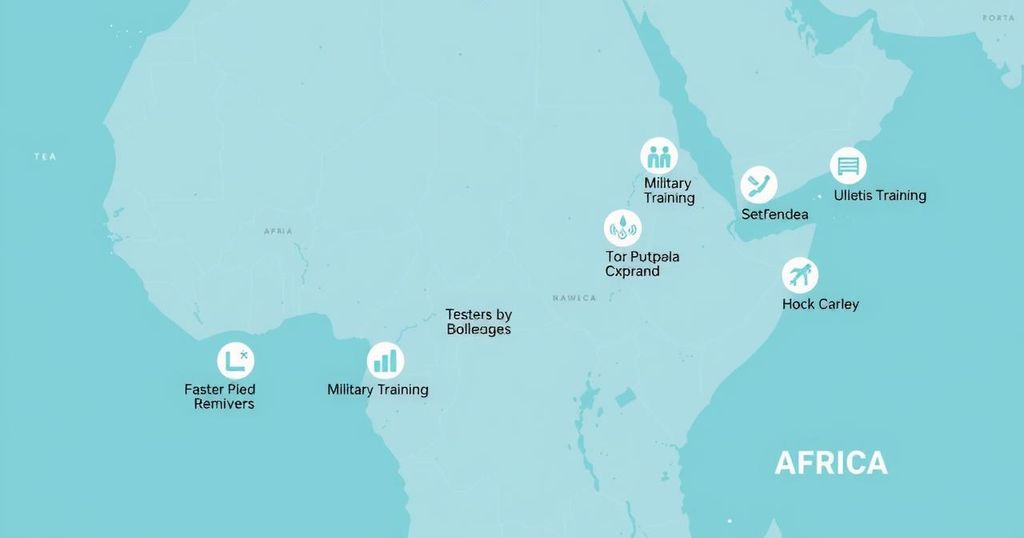Ukraine Seeks Allies in Africa Through Aid and Embassies

- Ukraine opens a new embassy in Mauritania as part of its Africa strategy.
- The embassy oversees aid delivery to Malian refugees fleeing violence.
- Ukraine offers military training to Mauritanian armed forces amid tensions.
- Nearly 300,000 tonnes of food aid have been provided to African nations.
- Ukraine’s outreach contrasts with Russia’s ongoing military ties in the region.
New plans highlight Ukraine’s diplomatic moves in Africa.
Ukraine’s New Strategy in Africa
Ukraine offers military training to Mauritania.
On the dry western edge of Africa, specifically in Mauritania, Ukraine is stepping up its global diplomatic efforts amid its ongoing conflict with Russia. The recently established embassy in the capital, Nouakchott, marks one of eight new missions opened throughout the continent since the start of Russia’s invasion in 2022. Here, Ukrainian officials are not only overseeing humanitarian food aid deliveries to Malian refugees but are also offering to train Mauritanian military personnel as tensions rise between Mauritania and Mali, where Russia has been reported to support government forces against Tuareg rebels. This push for military training is quietly significant; it aims to bolster ties and counteract the Kremlin’s influence in the region, which many consider a potential threat to stability. Ukraine’s top envoy to Africa, Maksym Subkh, expressed confidence in their capability to support Mauritania’s armed forces with battlefield technologies that Ukraine has developed in its defense against the Russian offensive.
Humanitarian aid remains a core focus.
However, the Mauritanian government has been less communicative about these offers of training, and responses from the Russian embassy in Mauritania were also rare. Russia, which has established a considerable presence in numerous West and Central African nations, recently reaffirmed its commitment to cooperation with these countries, particularly in defense. The Stockholm International Peace Research Institute classifies Russia as the main arms supplier to Africa, which complicates Ukraine’s effort to gain a foothold on the continent that is still finding its footing in the aftermath of colonialism. Ukraine’s engagement is not purely military; food security for many African nations is crucial. Recently, the country has delivered near 300,000 tonnes of aid via programs designed to counteract Russian narratives and provide a viable alternative to Moscow’s food aid swings. The strategy aims to increase trade and investment from countries that have long-standing ties to Moscow, which included a substantial commitment during the Cold War and significant support against apartheid. So the narrative is vital here – Ukraine wants African nations to see their fight against Russia as akin to their struggles with colonial legacies, hoping to build solidarity while providing tangible help to those in dire need.
Ukraine’s outreach affects regional dynamics.
Meanwhile, the food aid from Ukraine, distributed through the World Food Programme, has reportedly reached eight million people across twelve nations, including notable recipients like Congo, Ethiopia, and Somalia. Most aid has been directed toward Mbera, which has now grown into the largest refugee camp in West Africa due to the influx of displaced people fleeing violence in Mali. Over the last two years, the camp’s population has surged, with estimates rising from about 85,000 to nearly 250,000. The increase in Ukrainian food supplies aims not just to alleviate immediate suffering but to build a foundation of goodwill with countries that have, until now, been hesitant to take a side in the ongoing conflict. Ukraine’s recent exports of nearly 10 million tonnes of grain to Africa this year help position it as a significant alternative to Russian supplies, putting pressure on neutral nations to reconsider their stance. The assistant chargé d’affaires in Nouakchott, Roman Sereda, insists that maintaining this support is crucial for global food security, suggesting that it can limit Russia’s attempts to wield food supplies for political leverage and thus contribute to a more stable political environment in the region.
In summary, Ukraine is actively expanding its diplomatic and humanitarian efforts across Africa amid the ongoing conflict with Russia. With the establishment of new embassies and aid initiatives, Ukraine hopes to solidify its position as a viable partner for African nations, countering Russian influence. Despite facing hurdles and criticism, the trajectory presents an ambitious vision that connects historical legacies of colonialism with contemporary global conflicts.







